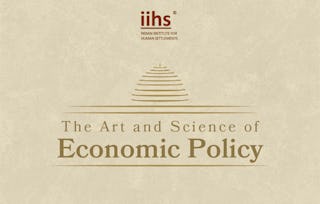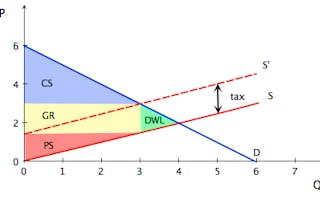Thinking critically about today's economy can help you understand the world around you. Economics: Society, Markets, and [In]equality will pique your curiosity and inspire you to learn more about the power dynamics that determine how people and resources are valued, how goods move around the world, and how we manage our planet and the future. Your understanding of economics will make you a better advocate, voter, investor, consumer, and citizen. You’ll also develop an understanding of the benefits and drawbacks of our current economic system and get a framework for thinking about how we, as individuals and as a society, can rethink our relationship with our planet and the way we interact with one another.
Economics: Society, Markets, and [In]equality
6 days left! Gain next-level skills with Coursera Plus for $199 (regularly $399). Save now.

(55 reviews)
Recommended experience
What you'll learn
Develop an economic worldview of questions of social and planetary resilience.
Communicate and discuss real-world economic issues, their historical context, and how they affect our society today.
Act on your new understanding of capitalism and markets by bringing a critical lens to the world around you.
Skills you'll gain
Details to know
See how employees at top companies are mastering in-demand skills

There are 5 modules in this course
Welcome to week 1 of Economics: Society, Markets and [In]equality. This week is about how economic analysis can help us understand the world around us and our history. This series of lessons starts off with an overview of modern capitalism and how it evolved and then explores profits and how they drive the economy. Finally, you’ll learn about how various economic philosophies that we may take for granted affect the way we see the world, especially how we view wealth and poverty. You’ll learn how these philosophies came to be, and you might even be challenged to rethink your own worldview. So, let’s get started!
What's included
4 videos3 readings1 assignment4 discussion prompts
Welcome to week 2 of Economics: Society, Markets and [In]equality. The lessons in this module take on the complex relationship between individual actions and social outcomes in capitalist economies. You’ll learn about the Good, the Bad, and the Ugly in the functioning of those economies: how competitive markets may give us good social outcomes, how decisions driven by the pursuit of individual profits can potentially destabilize the economy as a whole, and how capitalism can be understood to take advantage of certain social groups. So, let’s get started!
What's included
13 videos3 readings1 assignment4 discussion prompts
Welcome to week 3 of Economics: Society, Markets and [In]equality. This week covers the topic of Power at Work and refers to the concept of reservation wage throughout. As you progress through the lessons, you’ll learn about what restricts and empowers the bargaining power of workers. Finally, throughout the week you will also learn about key moments in history that have influenced the extent to which workers are able to obtain the security they need. The roles of government and unions will be discussed in this regard, as well as the influence of market structures. So, let’s get started!
What's included
8 videos5 readings1 assignment5 discussion prompts
Welcome to week 4 of Economics: Society, Markets and [In]equality. This week's lessons ask the questions: What is economic globalization? When did it originate? What are its consequences for people and their well-being? Why a Worldly Philosophy? This series of lessons explores the nature and extent of globalization and how society grew from isolated markets to an interconnected economic system. You’ll learn about the forces driving globalization, why and how companies buy parts and labor from other countries in global value chains, and how globalization benefits society. In addition, you’ll learn about the drawbacks of globalization—the winners and the losers—and how we might rethink the world economy to make it work better for a broader swath of society and a larger number of countries. So let's dive into the lessons and open your mind to the possibilities!
What's included
9 videos4 readings1 assignment4 discussion prompts
Welcome to week 5 of Economics: Society, Markets and [In]equality. This week culminates previous lessons and provides an opportunity to reflect on what critical changes need to be made. As you review this week, take time to reflect on what role you can play in shaping a better economy so people and the planet can thrive. So, let's get started!
What's included
2 videos2 readings1 peer review2 discussion prompts
Instructors


Offered by
Explore more from Economics
 Status: Free Trial
Status: Free TrialUniversity of Illinois Urbana-Champaign
 Status: Preview
Status: PreviewIndian Institute for Human Settlements
 Status: Preview
Status: PreviewUniversity of Pennsylvania
 Status: Preview
Status: PreviewErasmus University Rotterdam
Why people choose Coursera for their career




Learner reviews
55 reviews
- 5 stars
81.81%
- 4 stars
12.72%
- 3 stars
1.81%
- 2 stars
3.63%
- 1 star
0%
Showing 3 of 55
Reviewed on Jul 1, 2025
This course is Very beneficial for economics students and professional

Open new doors with Coursera Plus
Unlimited access to 10,000+ world-class courses, hands-on projects, and job-ready certificate programs - all included in your subscription
Advance your career with an online degree
Earn a degree from world-class universities - 100% online
Join over 3,400 global companies that choose Coursera for Business
Upskill your employees to excel in the digital economy
Frequently asked questions
To access the course materials, assignments and to earn a Certificate, you will need to purchase the Certificate experience when you enroll in a course. You can try a Free Trial instead, or apply for Financial Aid. The course may offer 'Full Course, No Certificate' instead. This option lets you see all course materials, submit required assessments, and get a final grade. This also means that you will not be able to purchase a Certificate experience.
More questions
Financial aid available,
¹ Some assignments in this course are AI-graded. For these assignments, your data will be used in accordance with Coursera's Privacy Notice.
